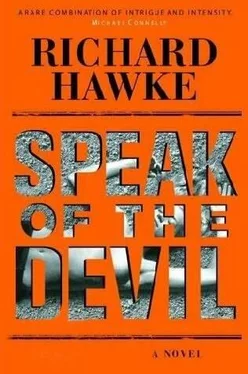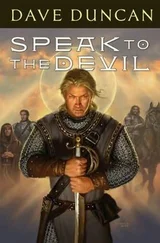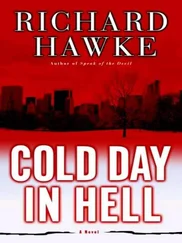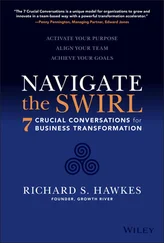“Tomorrow,” Leavitt said. “Gracie Mansion. Can you make it for breakfast?”
STOCKY LITTLE APELIKE FIGURES WITH POINTY DEVIL’S TAILS AND forearms the size of car batteries were taking turns beating me about the head and shoulders with baseball bats. There were three of them, and each time one swung its bat down over its head, the force of the blow lifted the creature right off its feet. Big flat hairy feet, like you might expect from the Abominable Snowman. The beating was being conducted in a decidedly democratic fashion, each creature taking turns. Almost metronomic. Bam-bam-bam . I was doing what I could to protect myself, but my efforts were only diverting the blows onto my neck and arms. Eventually, a voice deep down in my cerebral cortex told me to wake the hell up. I opened my eyes and the apelike figures disappeared.
I took a good long time in the shower. Not wanting to be groggy, I’d skipped the painkillers the night before, and now the pain in my shoulder was killing me. I dressed and went down to the corner market, bought the Post and some aspirin, which I washed down with a cup of burnt coffee. I probably could’ve managed without the sling, but I couldn’t see a reason for being excessively macho.
Gina Lombardi was putting out her mother’s sign as I came out of the market. She frowned at my sling. “What happened to you?”
I opened my palm to her and tapped it. “Can’t you see? Right here? This line means my shoulder is going to get dislocated.”
Gina laughed. “Sorry. I just don’t see it.”
“Right. Neither did your mother last time I let her pore over my palms. No warning whatsoever. What kind of racket is she running in there, anyway?”
“Did Mama tell you that you have a long lifeline?”
“Something like that. She also said I would never be a millionaire, but I wouldn’t starve.”
“So far, so true?”
“So far,” I said.
Gina shrugged. “So she missed a shoulder. You think this is rocket science?” She set the metal sign on the sidewalk. She had a few ears of Indian corn with her, and she attached these to the sign with some brown twine. I told her I liked the harvest touch. She tapped the side of her head. “Mama. She is always thinking.”
I walked up to Houston and flagged a cab. The Post was in high-octane mode over the Thanksgiving Day horrors. Lots of pictures. There was a photo of Officer Leonard Cox, the city’s newest hero, as well as a blurry shot of Roberto Diaz. It turned out that McNally, the cop Diaz had gunned down, had been Leonard Cox’s partner. The two had been working the parade together. Usually a fluff detail. Nothing new had come out yet on Diaz. Peppered throughout the accounts was speculation that the bombing at Barrymore’s might well be related to what had happened earlier in the day at the Thanksgiving parade. Silence on that particular subject from the police commissioner’s office was not going unnoted. Amazingly, Rebecca Gilpin’s presence in Barrymore’s at the time of the blast had been suppressed. She was mentioned only in relation to the parade shooting. Somebody in a place of power had clearly expended some capital to keep the actress’s presence at the restaurant out of the news. According to police sources, speculation was centering on the bomb at Barrymore’s having been in a bag that someone had left with coat check. The coat-check woman wouldn’t be offering any description, and no other witnesses seemed to be surfacing.
The cab dropped me off at Eighty-eighth Street. I relinquished my pistol to a security guard outside the gate at Gracie Mansion and submitted to a mild pat-down. There were two police cruisers as well as an unmarked car parked in front of the mayor’s residence. Looking around the side of the mansion, I saw a police boat anchored in the East River about two hundred yards offshore, rocking in the choppy morning current.
I was escorted inside by a guy who looked like he could hold down a weekend gig with the Giants. Young, thick, with a military cut and no visible sense of humor. I figured size-17 shoes, but I didn’t ask. Silent Giant passed me off to a woman who introduced herself as Emily Watson. “Not the actress,” she said. “Obviously.” She was around forty-five, skinny as a rail, salt-and-pepper hair pulled into a loose bun, with a sad, brave smile. She reminded me of a school infirmary nurse.
“Mayor Leavitt will be down in just a minute. He wanted me to ask if you need anything.”
I had a dozen ready responses to that question, but I pocketed them. “Orange juice,” I said.
“Right this way.”
She led me into the dining room. It was powder blue and as perfectly put together as a museum display, which in a way it was. They give tours of Gracie Mansion daily, except for Sundays. And except, I assumed, the day after a pair of major municipal tragedies. The mansion is a stately classical white-frame colonial house built in 1799 by Archibald Gracie. The estate and its eleven acres were appropriated by the city in 1896 to be included in the new Carl Shurz Park, and for many years the house had served as nothing more than the concession stand and restrooms for the park. In the early forties, Big Bad Bob Moses trained his visionary eye on the building and oversaw its transformation into the mayor’s official residence. The first mayor to reside there, Fiorello La Guardia, moved there in 1942. Allegedly, he complained about the drafts.
I took a seat at the far end of a long table, near three place settings, and I felt very silly when Emily Watson emerged from the kitchen with my crystal glass of orange juice on a little white plate.
“Fresh-squeezed,” she proclaimed. There was a seed floating on top, in case I had any doubt.
When Mayor Leavitt appeared a few minutes later, he was shadowed by Tommy Carroll. Leavitt appeared pensive but considerably less haggard than his police commissioner. He was in tan slacks and a blue Brooks Brothers shirt, the sleeves rolled up to his elbows. Leavitt had “famous-person hair,” as Margo liked to call it. In his case, thick and wavy and cut just so. He gave it a hand-combing as he approached the table, and it fell right back into place. There was a nodding of heads and a muttering of names, and the two took their seats on either side of me.
Leavitt spoke first. “How’s your shoulder?”
“Popped out, popped in,” I said. “I’ll get over it.”
“Rebecca wants me to thank you for what you did for her last night. I want to thank you, too.”
What I did for her. I sashayed her in full view from the theater to the restaurant directly across the street so that our mad bomber could have a nice good look at her. I couldn’t have been more boneheaded.
I asked, “How is she?”
“I just got off the phone with her. They’re going to keep her in the hospital for a few days. She’ll be confined to bed. Probably crutches after that. But her spirits are good.”
“No more show.”
He rolled his eyes. “The damn show. No, she’s officially out of it. That’s at least one headache off our plate.”
As if cued by the word “plate,” Emily Watson appeared from the kitchen carrying a large tray. She set it on the sideboard and presented each of us with a plate of scrambled eggs and bacon.
“I forgot to ask if you have any dietary restrictions, Mr. Malone.”
“I don’t. Pig and chicken are on my menu. Thank you.”
The tray included a thermos of coffee and a pitcher of cream. Emily Watson set those on the table, clicked her heels and disappeared.
Martin Leavitt played host, pouring out a cup of coffee for me. I couldn’t tell if he was putting on a charm offensive for my sake or if I was supposed to believe that this was his true nature.
Читать дальше












